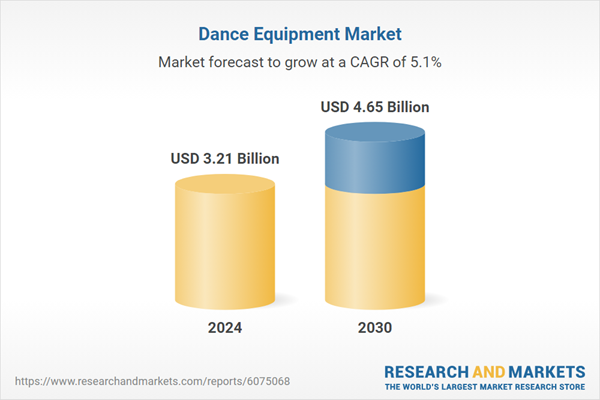Speak directly to the analyst to clarify any post sales queries you may have.
10% Free customizationThis report comes with 10% free customization, enabling you to add data that meets your specific business needs.
Key Market Drivers
Surge in Dance as a Fitness Activity
The surge in dance as a fitness activity is a major catalyst for the growth of the global dance equipment market. Dance-based fitness programs such as Zumba, hip-hop fitness, and dance aerobics have become immensely popular as enjoyable and effective alternatives to conventional workouts. These programs attract diverse demographics, from casual participants to serious fitness enthusiasts, who seek engaging ways to stay active. With the rising popularity of dance for fitness, there is increasing demand for specialized gear such as footwear, apparel, and accessories that optimize comfort, performance, and safety. Social media platforms play a pivotal role, with dance challenges and tutorials inspiring more individuals to try new styles. The growing integration of dance into fitness routines supports not only physical health but also mental well-being, fueling continuous demand for high-performance dance equipment globally.Key Market Challenges
High Cost of Specialized Equipment
The high cost of specialized dance equipment poses a significant challenge for the global dance equipment market. Professional-grade dance shoes, apparel, and accessories are often expensive due to the advanced materials and skilled craftsmanship required to meet high-performance standards. While such equipment is crucial for safety and enhanced performance, the cost can be prohibitive for amateur dancers, beginners, and individuals in lower-income regions. Dance studios and educational institutions also face financial strain in equipping students and staff with premium products. Consequently, some consumers may opt for cheaper, lower-quality alternatives, potentially leading to injuries and diminished performance, which could deter sustained participation in dance activities. To counter this, brands may need to innovate affordable, high-quality entry-level options to broaden accessibility.Key Market Trends
Rise Demand for Eco-Friendly Products
A growing trend in the global dance equipment market is the increased demand for eco-friendly and sustainable products. Environmentally conscious consumers and institutions are seeking dance apparel and accessories made from sustainable materials like organic cotton, bamboo, hemp, and recycled fibers, which offer both performance benefits and reduced environmental impact. Manufacturers are embracing circular fashion practices, emphasizing product durability and recyclability. Ethical production standards, including fair labor practices and localized manufacturing, are becoming increasingly important. Packaging innovations using biodegradable or reusable materials are also gaining prominence. This sustainability movement is reshaping product offerings and positioning eco-friendly dance equipment as a standard expectation among dancers and dance organizations committed to reducing their ecological footprint.Key Market Players
- Dancewear Solutions
- Dancewear Central
- Revolution Dancewear
- Ballet Makers Inc.
- Fitness & Fairies Dancewear Pvt. Ltd
- Jule Dancewear
- Bloch Inc.
- Eleve Dancewear
- Weissman
- Energetiks
Report Scope:
In this report, the Global Dance Equipment Market has been segmented into the following categories, in addition to the industry trends which have also been detailed below.Dance Equipment Market, By Product Type:
- Dancing Shoes
- Dancing Apparel
- Dancing Accessories
- Others
Dance Equipment Market, By Dance Type:
- Ballet
- Hip-Hop
- Jazz
- Others
Dance Equipment Market, By Distribution Channel:
- Specialty Stores
- Departmental Stores
- Online
- Others
Dance Equipment Market, By Region:
- North America
- United States
- Canada
- Mexico
- Asia-Pacific
- China
- Japan
- India
- Australia
- South Korea
- Europe
- France
- United Kingdom
- Italy
- Germany
- Spain
- South America
- Argentina
- Colombia
- Brazil
- Middle East & Africa
- South Africa
- Saudi Arabia
- UAE
- Turkey
Competitive Landscape
Company Profiles: Detailed analysis of the major companies present in the Global Dance Equipment Market.Available Customizations:
With the given market data, the publisher offers customizations according to a company's specific needs. The following customization options are available for the report.Company Information
- Detailed analysis and profiling of additional market players (up to five).
This product will be delivered within 1-3 business days.
Table of Contents
Companies Mentioned
- Dancewear Solutions
- Dancewear Central
- Revolution Dancewear
- Ballet Makers Inc.
- Fitness & Fairies Dancewear Pvt. Ltd
- Jule Dancewear
- Bloch Inc.
- Eleve Dancewear
- Weissman
- Energetiks
Table Information
| Report Attribute | Details |
|---|---|
| No. of Pages | 182 |
| Published | April 2025 |
| Forecast Period | 2024 - 2030 |
| Estimated Market Value ( USD | $ 3.21 Billion |
| Forecasted Market Value ( USD | $ 4.65 Billion |
| Compound Annual Growth Rate | 5.0% |
| Regions Covered | Global |
| No. of Companies Mentioned | 10 |









